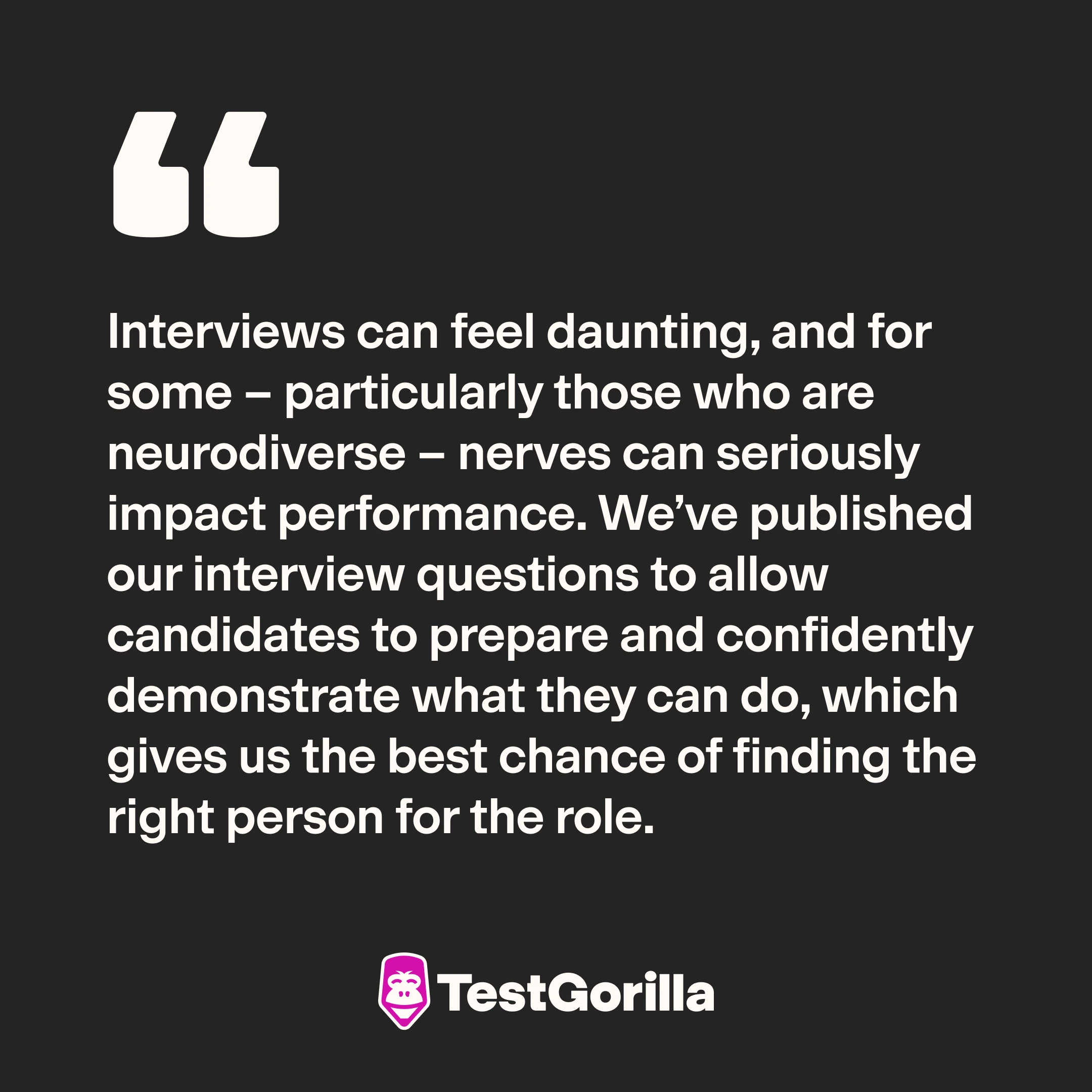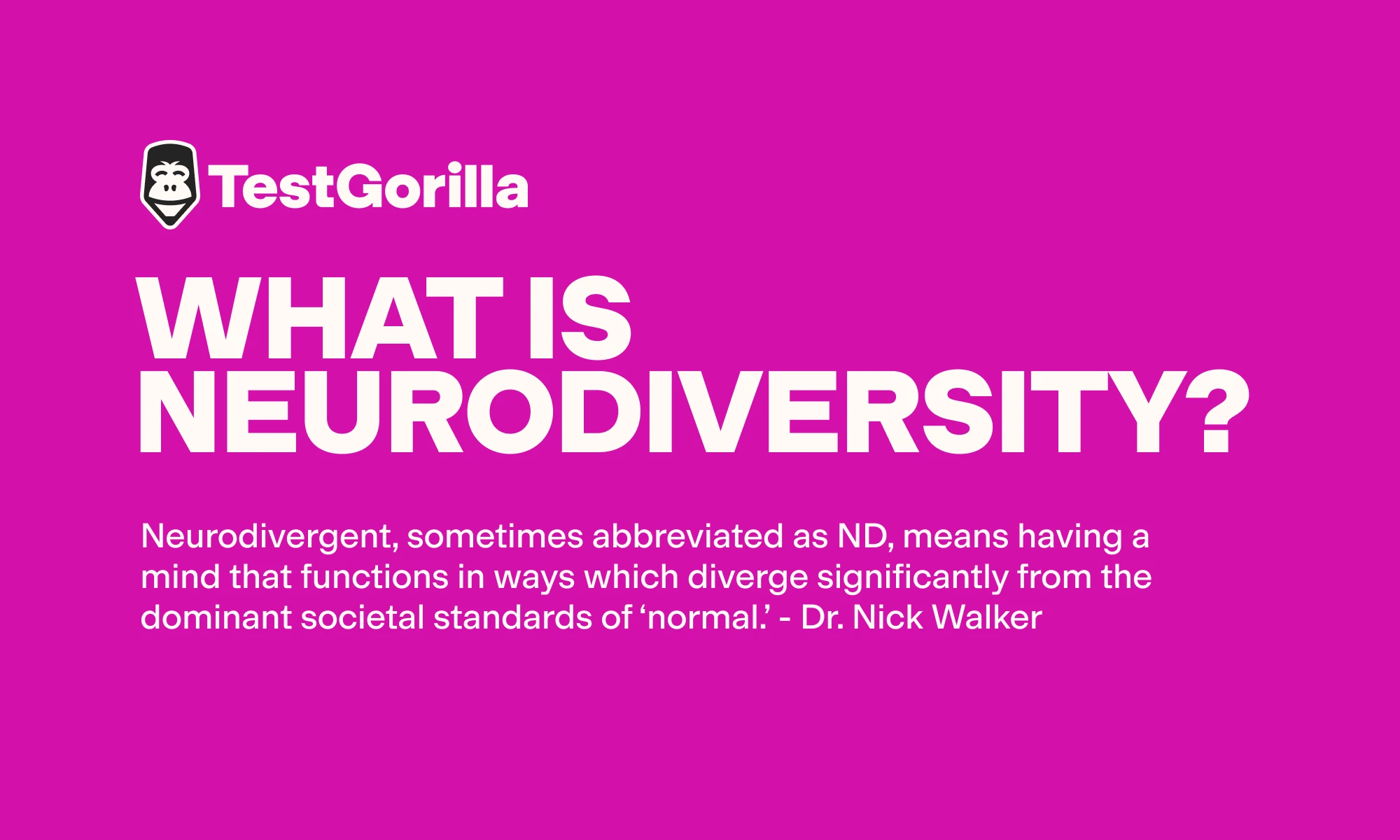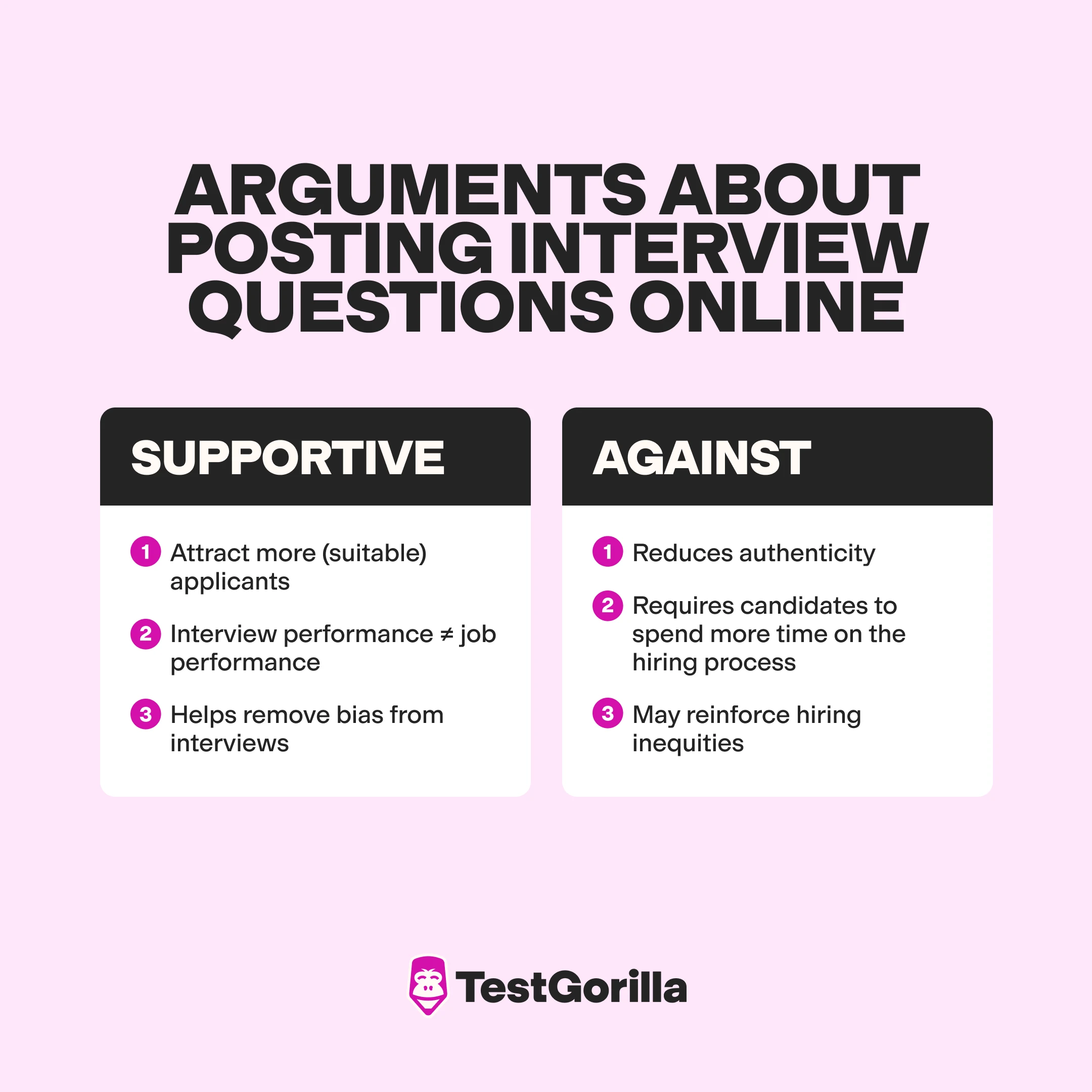Posting interview questions online: Should you do it?
In April 2024, UK retailer the John Lewis Partnership announced it would publish interview questions for all roles on its website, allowing candidates to prepare their responses.[1]
The HR community widely praised the move, particularly for its positive impact on neurodiverse people. These individuals are often underrepresented in the workforce and face barriers to employment, especially in traditional interview processes.
In light of John Lewis’s announcement, it’s a good time to ask: Should you adopt the same approach?
Below, we explore the arguments for and against providing candidates with interview questions in advance and explain why all employers should consider following John Lewis’s lead.
Table of contents
What’s happened?
UK retailer the John Lewis Partnership announced that it will publish interview questions online. Lorna Bullett, talent acquisition lead, explained the decision to People Management:
Interviews can feel daunting, and for some – particularly those who are neurodiverse – nerves can seriously impact performance. We’ve published our interview questions to allow candidates to prepare and confidently demonstrate what they can do, which gives us the best chance of finding the right person for the role.
Questions are available for all roles, from entry-level to senior leadership positions. The retailer has confirmed its interview process will continue to be “rigorous,” and candidates will be asked follow-up questions during the interview to explore their initial responses.
This is a bold move from a large UK employer that already provides extensive guidance and information about its hiring process on its careers website.
Inclusivity for neurodiverse job applicants
One of John Lewis’s main justifications for its decision is that it supports a more inclusive approach and helps level the playing field for neurodiverse candidates.
What is neurodiversity?
According to author and educator Dr. Nick Walker, “Neurodivergent, sometimes abbreviated as ND, means having a mind that functions in ways which diverge significantly from the dominant societal standards of ‘normal.’”
It’s a broad term that may apply to people with or without formal diagnoses. Although neurodiversity often refers to people with autism spectrum disorder (ASD), it also includes attention deficit hyperactivity disorder (ADHD), dyslexia, epilepsy, bipolar disorder, and sensory processing disorders.
The opposite of neurodivergent is neurotypical. As Dr. Walker explains, this means “having a style of neurocognitive functioning that falls within the dominant societal standards of ‘normal.’”
Neurodiversity and the hiring process
Statistics show that neurodivergent individuals face barriers and challenges to employment. It’s estimated that the unemployment rate for people on the autism spectrum in the US is 85% and 78% in the UK.
The hiring process, particularly interviews, can present unique challenges to neurodiverse individuals.
A large part of an interview is a candidate’s ability to read the interviewer(s) and their social cues, something many neurodiverse people struggle with. Other reasons why neurodiverse candidates may find interviews challenging include:
The inability to maintain eye contact with the interviewer, which may be interpreted as being rude or evasive or lacking enthusiasm.
Hypersensitivity to noise and light might make it more difficult for applicants to focus and perform their best in interview conditions.
Obsessive interests could result in candidates becoming hyper-focused and unable to move past one part of the interview.
Difficulty engaging in small talk may result in interviewers incorrectly labeling a candidate as lacking social skills.
According to the UK National Autistic Society, providing questions five to seven days before an interview is one of the best ways to address the barriers autistic people face in finding work.
As employment Training Consultant Catherine Leggett explains, “One of the main difficulties that autistic people have is thinking on their feet and being able to process information very very quickly.” By providing questions in advance, “they’ll be able to really construct meaningful replies to these questions.”
Neurodiversity and workplace diversity
Despite the underrepresentation of neurodiverse people in the workforce, there’s a strong business case for ensuring they form part of your workforce.
In addition to the broader benefits of workplace diversity, companies have reported specific advantages of hiring neurodiverse employees, especially in the tech sector, where diversity is an ongoing issue.
Companies such as SAP, JPMorgan Chase, and Ernst and Young (EY) have long-running Autism at Work programs to help remove barriers to employment for individuals with autism, recognizing their ability to offer unique perspectives, out-of-the-box thinking, and incredible attention to detail.
EY created its first Neurodiverse Center of Excellence (NCoE) in 2016 and now has 23 worldwide. The organization reports a 92% retention rate for neurodivergent employees and a 1.2 to 1.4 times “increase in productivity, quality, and timeliness of output with teams that include NCoE team members.”
Other arguments in support of posting your interview questions online
While supporting the inclusion of neurodivergent applicants in the hiring process is one of the main arguments in support of publishing your interview questions, there are also other benefits.
1. Attract more (suitable) applicants
Making your interview questions publicly available may be one way to position your company as an employer of choice.
Candidates have responded positively to John Lewis’s announcement. According to a People Management poll on LinkedIn, 67% of 1,385 respondents supported this approach to interviews and agreed that more employers should do the same.
However, only a handful of employers currently do it.
Building your employer brand is a crucial strategic advantage in the tight labor market. So, by posting your interview questions online, you can make your business stand out and attract more quality applicants.
This approach can help you attract not only more candidates but also the right ones.
Interview questions give job seekers further insights into a role and employer, including expectations, workplace culture, and growth opportunities. Candidates who sense that these don’t align with what they’re looking for may decide not to proceed with their application. This frees up your hiring team to focus on the most motivated applicants most likely suited to the job.
2. Interview performance ≠ job performance
Interviews are often a poor indicator of job success. Many candidates find them intimidating and overwhelming, and nerves, anxiety, and stress affect how they present and perform during an interview.
Speaking to RTE, career psychologist Sinead Brady explains how interviews can be an unpleasant ordeal for many candidates:
For others, interviews are this absolutely crippling experience. One in which [candidates] feel extremely nervous, one in which they find it really hard to think on their feet, and maybe find it very hard to put into words what they are able to do, even though they are brilliant at their job.
This is backed up by research. One study collected data from 307 candidates for Residence Assistance roles at a Canadian university over three years. It concluded that there was no relationship between interview anxiety and job performance and “that interviewees who are anxious are not necessarily those who will display low job performance once they are on the job.”
Why is this? Maybe it’s because interviews often don’t offer insights into job-specific skills. Interviews test for the ability to answer questions well on the spot in an artificial environment. How many times will the successful candidate need this skill in the role?
In the workplace, employees have time to prepare before important calls. They typically know the content of meetings in advance by receiving an agenda. Providing interview questions to candidates in advance recognizes and reflects these realities.
While this applies to all candidates, it’s especially relevant to neurodiverse candidates. In one study that compared autistic, other neurodivergent, and neurotypical candidates’ hiring experiences, a key theme was that traditional hiring methods over-emphasized social skills rather than job-related skills. One autistic respondent said, “I feel that interviews are only a test of your acting and social skills.”
3. Helps remove bias from interviews
Making your interview questions publicly available supports structured interviews, which are less biased than unstructured interviews.
Structured interviews involve a standardized set of questions for all candidates, while unstructured interviews are more flexible, reactive, and conversational.
While unstructured interviews may be helpful in specific circumstances, they’re generally prone to subjectivity, which could unfairly affect the outcome. According to Iris Bohnet, behavioral economist and Albert Pratt Professor of Business and Government at Harvard Kennedy School, unstructured interviews are “fraught with bias and irrelevant information.”
We’ve also known for a long time that unstructured interviews aren’t a good indicator of job performance. Key research from 1998 reviewed 85 years of literature and research on assessment/interview techniques and job performance. It found that structured interviews are a far better indicator of job performance than unstructured interviews – with average validities of 0.51 and 0.38, respectively.
With standard, publicly available questions, hiring teams can prepare structured interviews that ensure consistency and comparability without unconscious bias.
Arguments against posting your interview questions online
John Lewis’ announcement has also attracted some critics who, while acknowledging the importance of inclusivity for the neurodivergent community, are concerned that publishing interview questions undermines the hiring process in other ways.
1. Reduces authenticity
Speaking to the BBC, Daniel Harris, director at Robert Walters, noted that providing interview questions in advance may “take away some authenticity from an individual’s application process if they’ve had too much time to prepare.”
Interviews allow employers to assess candidates' skills and experience. Importantly, though, they offer insights beyond applicants’ resumes, including interpersonal skills and cultural fit.
With early access to interview questions, applicants will be able to craft a “perfect” response rather than answer spontaneously. They might turn to external sources, such as friends and family or even AI tools like ChatGPT, to help prepare their answers.
These prepared responses may not give the hiring manager or team genuine insights into a candidate’s suitability for a role. Candidate answers could also become more uniform and homogenous, undermining the insights interviews are meant to offer.
2. Requires candidates to spend more time on the hiring process
We’ve all heard of nightmare hiring processes that require applicants to prepare lengthy documents, taking up hours of their (unpaid) time. While not as extreme, providing candidates with questions before the interview puts an onus on candidates to spend more time preparing for an interview than they otherwise would.
This may increase applicants’ stress and anxiety leading up to an interview, affecting their performance. The prospect of having to spend time preparing may discourage some candidates from applying. And some candidates who do proceed with the recruitment process may feel resentful or frustrated toward the employer.
3. May reinforce hiring inequities
While providing interview questions in advance levels the playing field for neurodiverse applicants, this approach may disadvantage other candidates.
For instance, some candidates – such as single parents or caretakers – may have less time to prepare for an interview, which can put them at a disadvantage.
Some candidates may also have greater access to resources to prepare their answers, including professional coaching or stronger support networks, while others have limited access or none at all.
Our take at TestGorilla
For us, the pros of providing interview questions to candidates in advance far outweigh the cons, especially when creating more inclusive hiring practices for neurodiverse job seekers.
While John Lewis’s example is a step in the right direction, employers can do even more to support neurodivergent candidates in interviews. For example:
Consider the interview format. Some neurodiverse candidates may be more comfortable participating in recorded video interviews than in-person ones.
Assess the interview environment. To support neurodiverse candidates, ensure interviews are conducted in a quiet space with lower lighting and free from strong scents.
Decide whether interviews are the best way to assess candidates’ suitability for a role. Other skills-focused methods, such as skills-based assessments, may give neurodiverse candidates more opportunities to demonstrate their abilities fully. Some neurodiverse candidates have actually expressed a preference for work trials over interviews to showcase their abilities.
Education is also essential. Neurodiversity is not always well understood. By providing your hiring team with the proper training, they can better understand how neurodiverse candidates feel about the interview process and what they can do to support them better.
Here are some resources where you can learn more about how your organization can help reduce employment barriers for neurodiverse people:
Autism Society (US)
Employer Assistance and Resource Network on Disability Inclusion (EARN)
The neurodiverse community is wide, and there’s no one approach to interviews that’s best for all neurodivergent people. So, foster a workplace culture where candidates are comfortable disclosing their neurodiversity and listen to candidates’ needs when it comes to making interview accommodations for them.
Inclusive interviewing could transform hiring
John Lewis’s decision to post its interview questions online should encourage every employer to review how their hiring practices, especially interviews, support neurodiverse candidates.
We believe it’s a positive step in the right direction for all candidates. Aside from supporting inclusivity and workplace diversity, providing candidates with interview questions in advance helps employers attract more quality candidates and allows for fairer structured interviews.
John Lewis has set a powerful example - will you follow suit and prioritize inclusivity in your hiring process?
[1] BBC, John Lewis job applicants get questions beforehand, 26 April 2024, https://www.bbc.com/news/articles/c6pyqjm1219o.
Related posts
You've scrolled this far
Why not try TestGorilla for free, and see what happens when you put skills first.
Latest posts
The best insights on HR and recruitment, delivered to your inbox.
Biweekly updates. No spam. Unsubscribe any time.

Skills tests to hire the best
Our screening tests identify the best candidates and make your hiring decisions faster, easier, and bias-free.
Free resources
A step-by-step blueprint that will help you maximize the benefits of skills-based hiring from faster time-to-hire to improved employee retention.
With our onboarding email templates, you'll reduce first-day jitters, boost confidence, and create a seamless experience for your new hires.
This handbook provides actionable insights, use cases, data, and tools to help you implement skills-based hiring for optimal success
A comprehensive guide packed with detailed strategies, timelines, and best practices — to help you build a seamless onboarding plan.
This in-depth guide includes tools, metrics, and a step-by-step plan for tracking and boosting your recruitment ROI.
Get all the essentials of HR in one place! This cheat sheet covers KPIs, roles, talent acquisition, compliance, performance management, and more to boost your HR expertise.
Onboarding employees can be a challenge. This checklist provides detailed best practices broken down by days, weeks, and months after joining.
Track all the critical calculations that contribute to your recruitment process and find out how to optimize them with this cheat sheet.

















